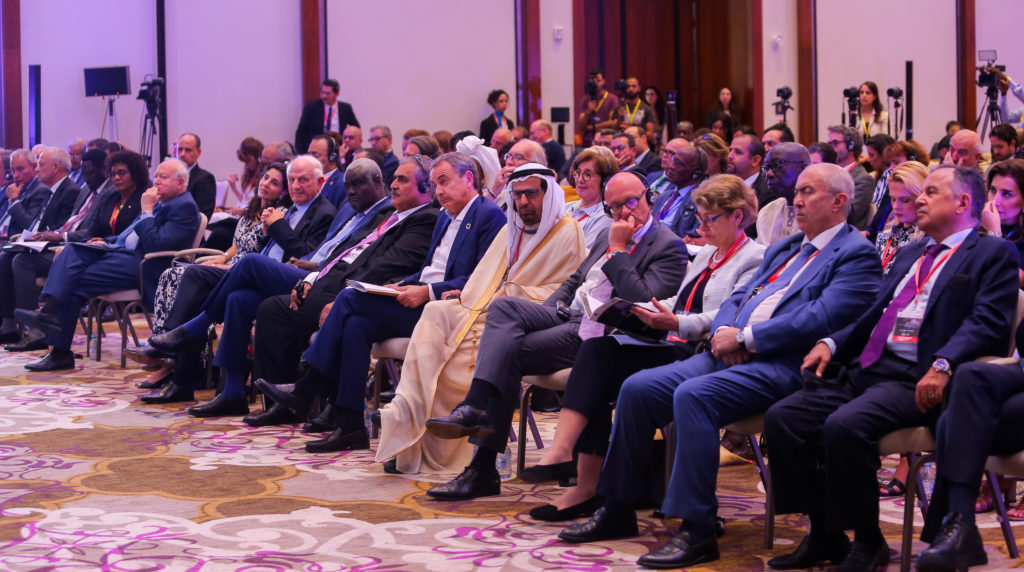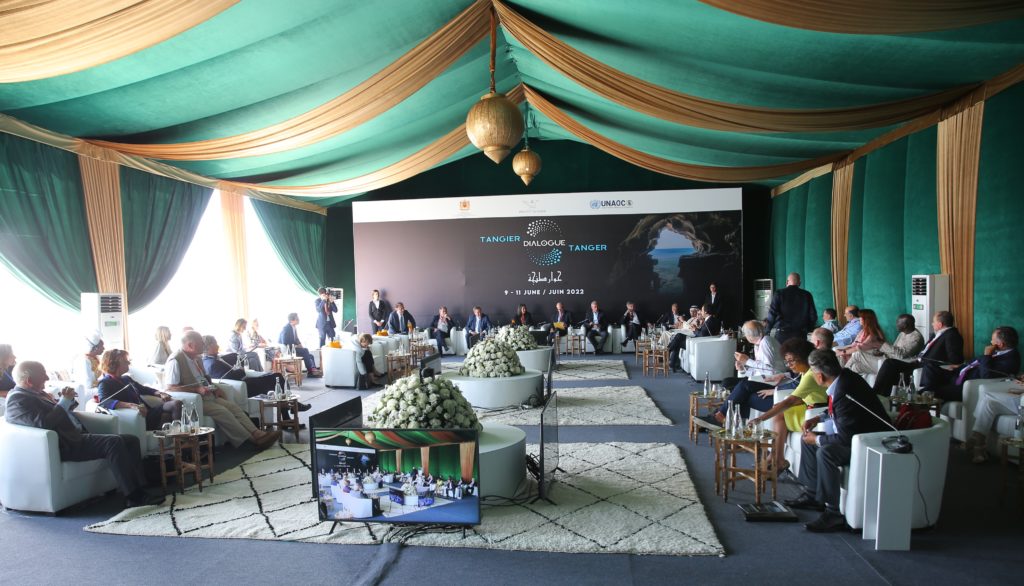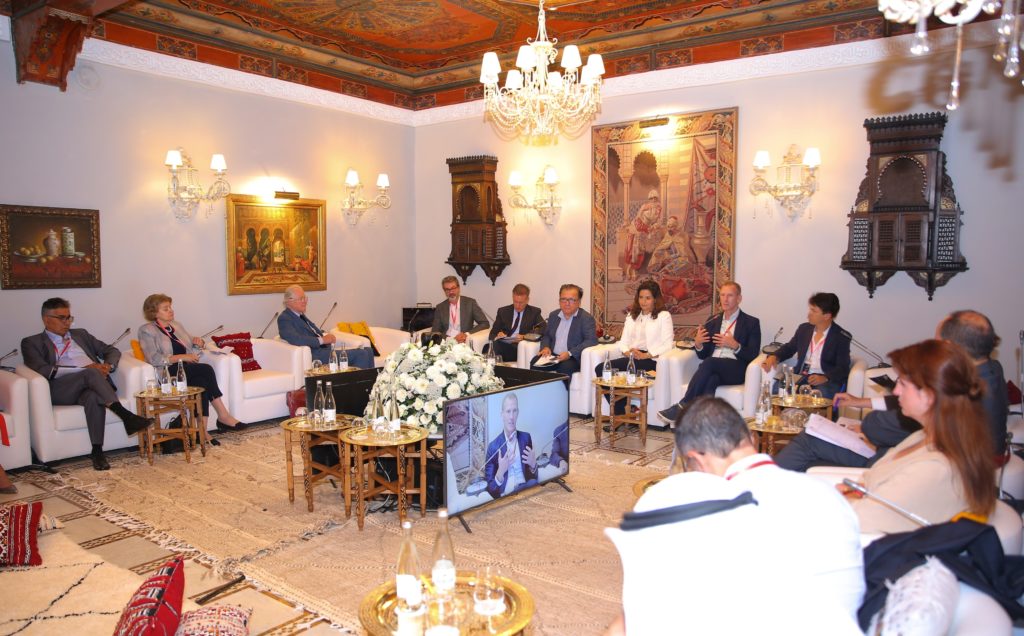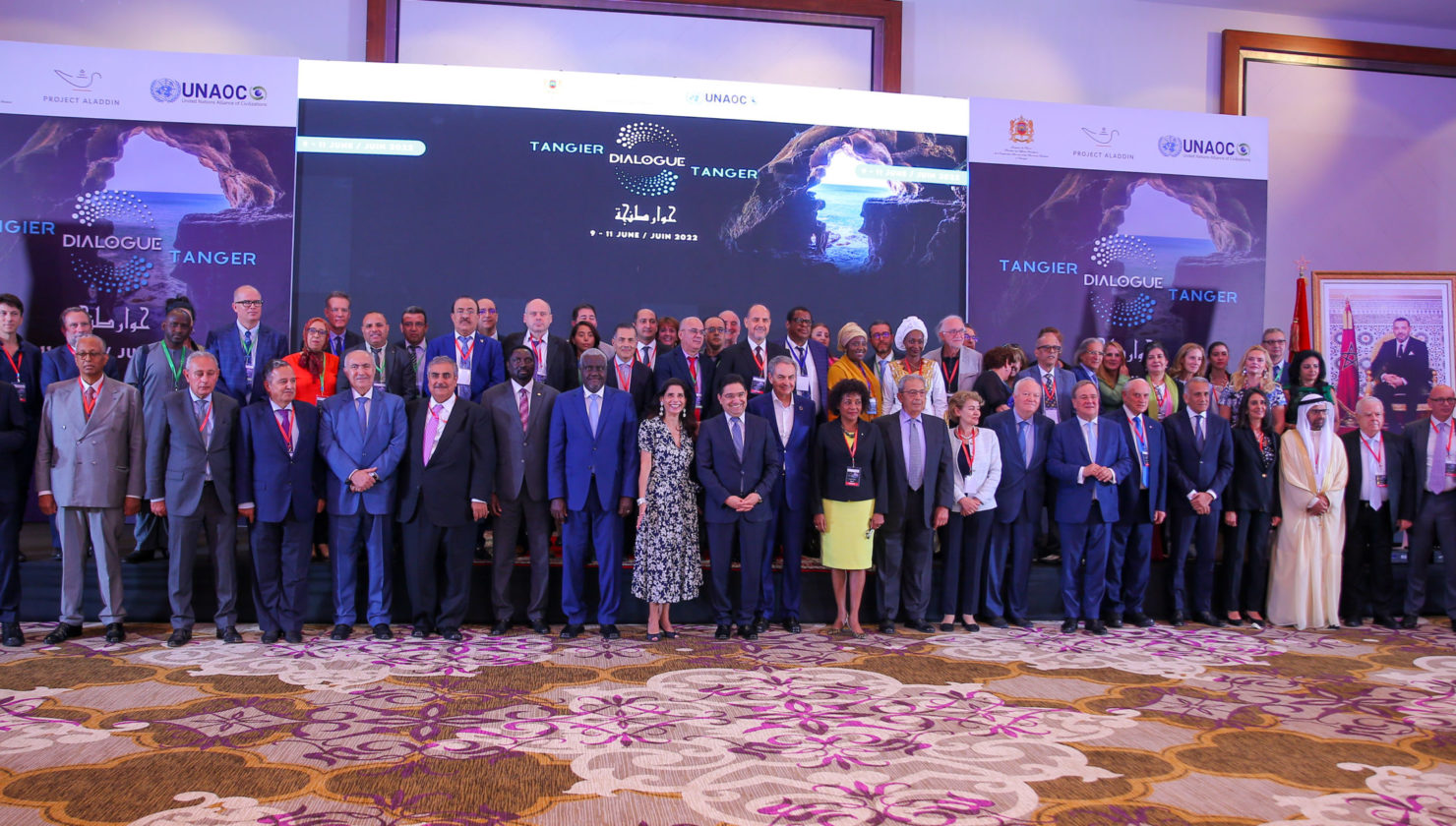The inaugural meetings of The Tangier Dialogue, organized by Project Aladdin in partnership with the Moroccan Ministry of Foreign Affairs and the United Nations Alliance of Civilizations (UNAOC), took place on June 10 and 11, 2022, in the historic city of Tangier in northern Morocco with the objective of exploring strategies and roadmaps towards a “new, shared Enlightenment” between the West and the Muslim and Arab regions of the world.
The launch conference was opened by Leah Pisar, Chair of Project Aladdin, Nasser Bourita, Minister of Foreign Affairs of Morocco, and Miguel Ángel Moratinos, United Nations Under-Secretary General and High Representative of the UN Alliance of Civilizations, in the presence of more than 80 senior representatives of governments, Ministers, heads of international and regional organizations, and intellectuals, entrepreneurs, scholars, artists, and journalists from 30 nations in Africa, the Middle East, Europe, and North and South America.
Moussa Faki, Chairperson of the African Union Commission and former Prime Minister of Chad, delivered the keynote address on behalf of his organization, while Sheikh Khalid bin Ahmed Al Khalifa, Adviser for Diplomatic Affairs to His Majesty King Hamad bin Issa Al Khalifa of Bahrain; Sheikh Ali Rashid Al-Nuaimi, Chairman of the Defense, Interior, and Foreign Affairs Committee of the Federal National Council of the United Arab Emirates, Gambian Minister of Foreign Affairs Mamadou Tangara, and Ahmed Bah, Diplomatic Advisor to the President of Mauritania, spoke on behalf of their respective governments. The Crown Prince of Oman and the Deputy Prime Minister and Minister of Foreign Affairs of Ethiopia sent their ambassadors in Morocco to represent them during the two-day discussions.
The dignitaries who took part in the 2022 edition of the Tangier Dialogue included André Azoulay, Advisor to His Majesty King Mohammed VI of Morocco; José Luis Rodriguez Zapatero, former Prime Minister of Spain; Enrico Letta, leader of Italy’s Democratic Party and the country’s former Prime Minister; Project Aladdin cofounder and President of Shoah Memorial Baron Eric de Rothschild; Nasser Kamel, Secretary General of the Union for the Mediterranean; Amr Moussa, former Secretary General of the Arab League and Foreign Minister of Egypt; Nadia Fettah, Moroccan Minister of Economy and Finance; Leila Benali, Moroccan Minister for Energy Transition and Sustainable Development; Mohamed Mhidia, Governor of the Tangier-Tetouan-Al Hoceima region; Michaëlle Jean, former Governor General of Canada and Secretary General of the International Organization for Francophonie; Nabil Fahmy, Dean of the American University of Cairo and former Egyptian Minister of Foreign Affairs; Mohamed Abdelsalam, Secretary General of the Higher Committee for Human Fraternity and Secretary General of the Muslim Council of Elders; Ahmed Abbadi, Secretary General of the Mohammadia League of Scholars of Morocco, and Armin Laschet, former Prime Minister of North Rhine Westphalia and leader of the Christian Democratic Union of Germany who is now Vice-President of the Parliamentary Assembly of the Council of Europe.

Sheikh Khalid bin Khalifa Al Khalifa, Chairman of the Board of Trustees of the King Hamad Global Center for Peaceful Coexistence; former UNESCO Director-General Irina Bokova; Adama Dieng, UN Independent Expert in Sudan and former Special Advisor to the Secretary General for Genocide Prevention, and Malcolm Hoenlein, Executive Vice Chairman of the Conference of Presidents of Major American Jewish Organizations, were also present, as were Ambassador Lee Wolosky, President Obama’s special envoy and until recently Legal Counsel to President Biden; Lebanese parliamentarian Fouad Makhzoumi; senior Conservative Peer and former British Minister of Justice Lord Wolfson, and acclaimed Franco-Moroccan author Tahar Ben Jelloun.
The journalists who took part in the Tangier Dialogue as participants included veteran Saudi Editor in chief of Elaphand former Editor in chief of Al-Sharq AL-Awsat, Othman Al Omeir; Roger Cohen, New York Times; Tony Barber, Europe editor of the Financial Times; Renaud Girard, Chief international editorialist of Le Figaro; Naoufer Ramoul,Journalist and anchor at Dubai TV; Yves Kugelmann Editor in chief of the Swiss weekly Tachles; Hatim Betioui, Journalist at Ash Sharq Al-Awsat, and Mauritanian media executive and Sahel specialist Abdullah Mohamedy Bah.
The business community was strongly represented at the Tangier Dialogue with the participation of Ylias Akbaraly, President of Thomson-Sipromad Group and laureate of the 2021 Africa CEO of the Year; Frederik Paulsen, Honorary Chairman of Ferring Pharmaceuticals; Makonnen Asmaron, President of the Piccini Group, and Meridiam’s Omri Gainsburg and Amy Sloane-Pinel, who represented CEO Thierry Déau.
A uniquely diverse gathering of minds and talents
At the welcoming dinner in the honor of participants that was held at Le Mirage Hotel, the iconic venue of the Tangier Dialogue, Project Aladdin’s Executive Director Abe Radkin pointed out that the Tangier Dialogue’s founding premise was to create a trusted and safe space for freewheeling exchanges among a unique group of thinkers and practitioners who represented a broad spectrum of opinion and viewpoints.
In addition to the Ministers and dignitaries mentioned above, these included former Moroccan Minister of Education Rachid Benmokhtar, Spanish diplomat, veteran bridge builder and Deputy Secretary General for Water, Environment and Blue Economy Ambassador Alvaro Albacete, Chairman of the S. Daniel Abraham Center for Strategic Dialogue and former Israeli Minister Ephraim Sneh, cofounder of the International Forum for Peace in the Middle East and former Palestinian Deputy Minister Anis Al-Qaq, Atlantic Council senior fellow and former U.S. National Security Council director Jamie Metzl, Columbia Law professor Sarah Cleveland, professor of Economics at NYU and former Senior Advisor to the Undersecretary for International Affairs at the U.S. Treasury Department Nouriel Roubini, professor of Middle East Studies and International Affairs at SAIS, John Hopkins University and former advisor to President Obama Vali Nasr, Washington Institute for Near Eastern Policy Executive Director Robert Satloff, and British-American historian, author and distinguished professor at Florida International University Tudor Parfitt.
Saudi anthropologist and Senior Research Fellow at King Faisal Center for research and Islamic Studies Abdullah Hamidaddin, French General Comptroller of the Ministry of Finance Dominique Bocquet, Botnar Foundation’s board member Amalie Molhant-Proost, Argentine-American composer Andalusian culture expert Ezekiel Vinao, Professor of Arab Crossroads Studies Monica Marks from NYU-Abu Dhabi, Moroccan author on women’s issues in Muslim societies Asma Lemrabet, Turkish documentary producer Asligul Atasagun, Founder and Chair of Exponential Medicine Daniel Kraft, and Franco-Moroccan novelist and educator Anissa Bouziane actively participated in the two-day discussions. Noura Berrouba, president of the National Council of Swedish Youth Organizations and former president of the European Youth Parliament, was a staunch spokesperson for the younger generations during the lively exchanges.
Abe Radkin expressed his sincere thanks to Ambassador Mohamed Methqal, Director General of the Moroccan Agency for International Cooperation, for the unsparing efforts of his teams during the months of close cooperation with the staff of Project Aladdin to make the Tangier Dialogue a great success.
The Jalsas and the Muhadereen
The Tangier Dialogue’s format was a series of Jalsas – Arabic for session, but used here in the context of medieval Andalusia, where muhadarat – free-wheeling and unvarnished discussions among scholars, philosophers, and theologians – were common. The main themes of the Jalsas were the economic factors in the dynamics of relations between the West and the Muslim world; the way technology, access to health care, and climate change are shaping trends and policies in Africa and the Middle East; the need for a “reset” in relations between the West and Muslim and Arab regions; the place of culture and education in the new era of partnerships, and the short and medium term prospects for the Middle East and North Africa in light of the recent geopolitical changes sweeping the region.


The Way Forward
The next edition of The Tangier Dialogue will take place in June 2023. In the meantime, the participants will continue their exchanges to finalize a series of reports, recommendations, and proposals that will be addressed to international organizations, governments, the private sector, civil society organizations, youth and academia that could contribute to policies, programs and practices at the national, regional, and global levels that will ultimately drive shared progress and prosperity.
